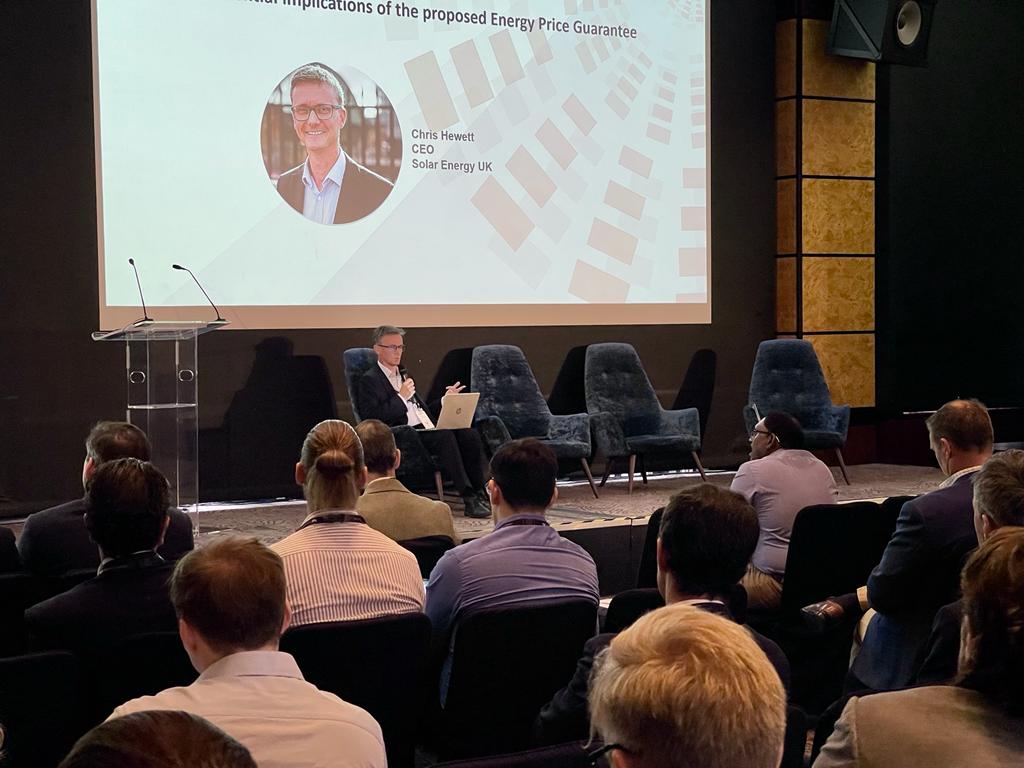
Chris Hewitt spoke as part of the first sessions of the UK Solar Summit in London. Image: Solar Media.
“There are grounds for hope” within the introduction of a Contracts for Difference (CfD) scheme for existing renewables, according to Solar Energy UK’s CEO Chris Hewett.
Speaking on the first morning of the UK Solar Summit in London, Hewett set aside a session to discuss the new support measures announced by Prime Minister Liz Truss on Thursday 8 September.
These include domestic energy bills being capped at £2,500 for the next two years – through a support scheme dubbed the Energy Price Guarantee, – six months of support for businesses, the end to the moratorium on fracking in the UK and a new licensing round for North Sea oil and gas, the establishment of an Energy Supply Taskforce and an Energy Markets Financing Scheme, amongst others.
One of the key elements announced with regards to the solar sector was the confirmation of a CfD scheme for operating assets.
“Renewable and nuclear generators will move onto Contracts for Difference to end the situation where electricity prices are set by the marginal price of gas,” said Truss in her address to the House of Commons.
“This will mean generators are receiving a fair price, reflecting their cost of production, further bringing down the cost of this intervention.”
Such a scheme was originally pitched by the UK Energy Research Centre, and would see project under the Renewable Obligations (RO) scheme offered a new, voluntary, fixed price contract as part of a ‘Pot Zero’ CfD scheme.
As such it could help lower energy bills in the short term, and provide generators with long term security.
The proposal had already received the backing of Solar Energy UK, along with other trade bodies such as Energy UK and RenewableUK in recent weeks.
According to Hewett, there are around 2,000 RO assets that the new scheme could apply to, but many of the key details of how it will work are yet to be announced.
Questions still remain as to what a Pot Zero CfD would look like exactly, and work needs to be done to understand if renewable generators are gaining windfall profits from the current high power prices, how many would consider a CfD, and how much of their capacity is locked into other contracts like corporate PPAs amongst others.
While “there are clearly massive risks” with this new system Hewett said, it also offers significant potential to the renewable sector, and therefore engagement within the design process will be key.
It could form part of the initial steps being taken to decouple gas prices, alongside the longer term process of Government’s Review of Electricity Market Arrangements that could offer additional security to the solar sector.
As the solar sector works to position itself as part of the solution to the energy crisis, the success of schemes like the Pot Zero CfD could help boost its perception amongst the public and government.
With the government effectively underwriting the high gas prices, solar and other renewables are being reframed. No longer are they a drag for the Treasury but a boom, and this shift could be catalysed to drive growth.
Tickets are still available for the second day of the UK Solar Summit tomorrow (15 September), to find out more and buy tickets, see here.

